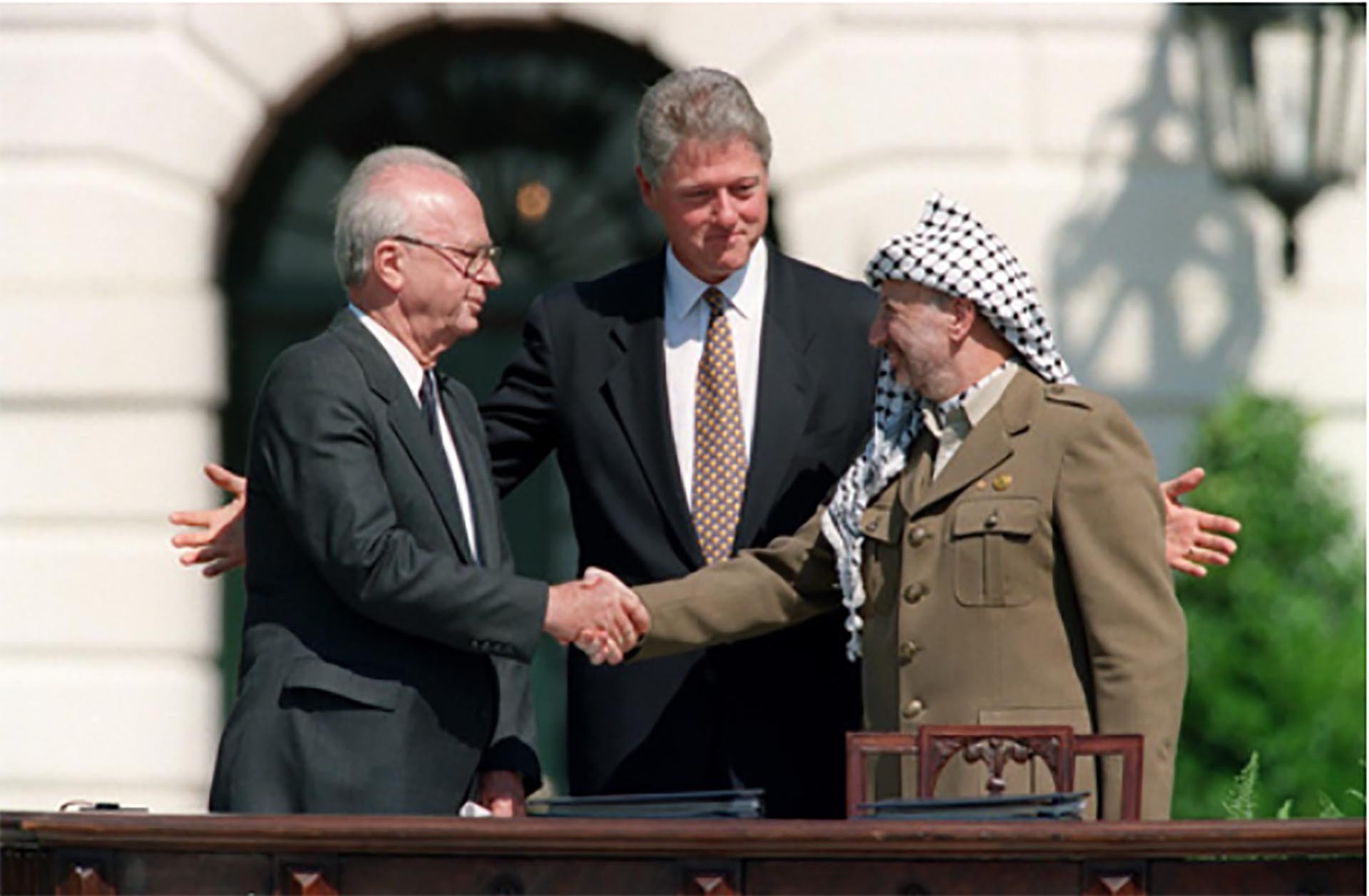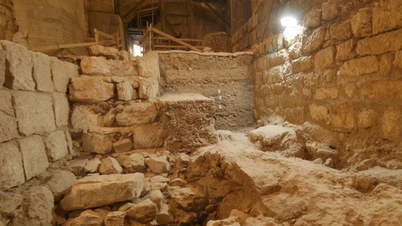The unprecedented Hamas attack on Israel on October 7th, which provoked a massive retaliation from Tel Aviv, has plunged the Middle East into a new spiral of violence and instability, demonstrating that conflict in this "powder keg" remains one of the most complex, persistent, and difficult problems in the world to solve.
 |
| The parties involved in signing the Oslo Accords at the White House (USA) in 1993. (Source: History.com) |
Going back in history
From the 11th century BC, the ancient Jewish state emerged in the land of Palestine. By the 8th century BC, the Jewish states were destroyed, and Palestine successively came under the rule of the Assyrian Empire, the Babylonian Empire, the Persian Empire, and the Roman Empire for many centuries, before the Arab Muslims conquered the region.
Palestine became part of the Ottoman Empire in the mid-16th century. With the rise of anti-Semitism in Europe, a wave of Jewish migration to Palestine began in the early 1880s. Following the defeat of the Ottoman Empire in World War I, Palestine became a British Mandate territory in 1918. In the early 1920s in Jerusalem, Amin al-Husseini – the leader of the Palestinian Arab nationalist movement – launched riots against Jews, forcing them to flee the Gaza Strip.
When World War II broke out, Jews and Arabs temporarily cooperated, siding with the Allies. However, some extremist Arab nationalists, such as al-Husseini, tended to cooperate with the Nazis, continuing the anti-Semitic movement in the Arab world. Towards the end of World War II, a new wave of Jewish immigrants to Palestine, survivors of the Holocaust in Europe, reignited tensions between the two sides. By 1947, Jews comprised 33% of the Palestinian population but controlled only 6% of Palestinian territory.
On November 29, 1947, the United Nations General Assembly adopted Resolution 181, dividing the historic land of Palestine into an Arab state and a Jewish state, while Jerusalem was placed under international administration. The Jews enthusiastically accepted the plan, but the Arabs vehemently opposed it, arguing that 56% of the historic Palestinian territories would be given to the Jewish state, including much of the fertile coastal region, while the Arabs already possessed 94% of Palestine's land and 67% of its population.
On May 14, 1948, the Jewish people officially declared the establishment of the State of Israel, recognized by both superpowers, the United States and the Soviet Union, in less than an hour. Unwilling to accept this reality, Arab nations attacked Israel, leading to the First Arab-Israeli War in 1948. By 1949, a ceasefire was signed, but most of the Palestinian territories allocated to Arabs under Resolution 181 were annexed by Israel, while Jordan annexed the West Bank and Egypt occupied the Gaza Strip. Israel also annexed West Jerusalem, while East Jerusalem was temporarily placed under Jordanian control. Having lost all its territory, a massive wave of Arab migration from Palestine to neighboring countries erupted.
In 1964, the Palestine Liberation Organization (PLO) was founded by Yasser Arafat, and the Fatah political party was also established a year later. In 1967, Arab countries began planning a second attack on Israel. In response, Israel launched a preemptive offensive against three Arab countries: Syria, Jordan, and Egypt, leading to the outbreak of the Six-Day War. Once again, Israel achieved victory, conquering the West Bank (including East Jerusalem), the Gaza Strip, the Golan Heights, and the Sinai Peninsula.
After the Six-Day War, the PLO fled to Jordan and received support from King Hussein. In 1970, the PLO unexpectedly rebelled against the King of Jordan during the "Black September" events, then moved to Southern Lebanon, establishing a base to continue attacks on Israel. In October 1973, Egypt and Syria attacked Israel again in the October War, coinciding with the holy Jewish holiday of Yom Kippur. However, once again, Israel emerged victorious. Following this, Israel returned the Sinai Peninsula to Egypt under the 1978 David Camp Peace Agreement.
However, hopes for restoring peace in the region were dashed after a series of attacks by the PLO and other Palestinian armed groups. In 1982, Israel retaliated by launching a full-scale offensive on Lebanon. The Palestinian armed groups were quickly defeated within weeks. The PLO headquarters were evacuated to Tunisia in June 1982 by decision of PLO leader Yasser Arafat.
Simultaneous Holy War
The Palestinian Intifada (Simultaneous Holy War) movement began in 1987, leading to the formation of Hamas – a force advocating armed struggle, unlike the PLO and Fatah which focused on diplomacy and politics. In 1988, the Arab League recognized the PLO as the sole representative of Palestine, creating conflict among Palestinian forces.
In the early 1990s, international efforts to resolve the conflict intensified. On September 13, 1993, the Oslo Accords I were signed by Israeli Prime Minister Yitzhak Rabin and PLO Chairman Yasir Arafat, in the presence of US President Bill Clinton, allowing the PLO to withdraw from Tunisia and establish a Palestinian state government in the West Bank and Gaza Strip. However, this peace process faced significant opposition from Palestinian Islamist groups, notably Hamas and Fatah.
In September 1995, a new interim agreement (the Oslo II Accords) was signed in Washington to expand autonomy in the West Bank. However, on November 4, 1995, Prime Minister Yitzhak Rabin was assassinated by a Jewish extremist. In 2004, President Arafat died, bringing the seemingly rekindled Middle East peace process back to a standstill.
After years of unsuccessful negotiations, the second Intifada erupted in September 2000, stemming from a provocative visit by Israeli opposition leader Ariel Sharon of the Likud party to the Al-Aqsa Mosque, with thousands of security forces deployed in and around the Old City of Jerusalem. Violence escalated into an open conflict between the Palestinian National Security Forces and the Israeli Defense Forces, lasting throughout 2004-2005. During this time, Israel continued to retake areas previously controlled by the Palestinian Authority and began constructing a wall separating the Gaza Strip from Israeli territory and building settlements in the West Bank. By June 2007, Israel began imposing a land, air, and sea blockade on the Gaza Strip. In February 2009, a ceasefire was signed with the mediation of the international community, although sporadic clashes between the two sides continued.
| The land of Palestine, with its holy city of Jerusalem, holds a particularly important role for all three religions: Judaism, Christianity, and Islam. Jerusalem is the holiest city in Judaism, the former site of Jewish synagogues, and the capital of the ancient kingdom of Israel. For Christians, Jerusalem is where Jesus was executed and where the Church of the Holy Sepulchre is located. For Muslims, Jerusalem is the site where the Prophet Muhammad made his “night journey to paradise” and where the al-Aqsa Mosque was built. |
History repeats itself.
On November 29, 2012, UN General Assembly Resolution 67/19 was adopted, upgrading Palestine to the status of a “non-member observer state” at the UN. This change in status was described as a recognition of Palestine’s national sovereignty. However, conflict between Palestine and Israel continued to erupt frequently. In the summer of 2014, Hamas fired nearly 3,000 rockets at Israel, and Tel Aviv retaliated with a major offensive in Gaza. The fighting ended in late August 2014 with a ceasefire brokered by Egypt.
Following a wave of violence between Israelis and Palestinians in 2015, Palestinian President Mahmoud Abbas declared that Palestinians would no longer be bound by the territorial division established by the Oslo Accords. In May 2018, fighting erupted again between Hamas and Israel. Hamas fired 100 rockets from Gaza into Israel. Israel retaliated with attacks on more than 50 targets in Gaza over a 24-hour period.
In 2018, President Donald J. Trump moved the U.S. embassy from Tel Aviv to Jerusalem, a reversal of long-standing U.S. policy on the Palestinian issue. This decision by the Trump administration further fractured the Middle East, despite being praised by Israel and some allies. In August-September 2020, the United Arab Emirates (UAE) and later Bahrain agreed to normalize relations with Israel, and Saudi Arabia is considering normalizing relations with Tel Aviv. Prior to this, Egypt and Jordan had normalized relations with Israel in 1979 and 1994, respectively.
The trend toward normalization between Muslim countries and Israel is supported by the US and many Western nations, but Palestinian forces and some countries have rejected these agreements. On October 7, Hamas launched thousands of rockets into Israeli territory, causing hundreds of casualties. Israel vowed fierce retaliation, sparking a new and escalating conflict between Palestine and Israel. The painful history of instability in the Middle East is repeating itself.
Source




































![[Photo] Radiant smiles at the "Building Tet" festival in Da Nang](https://vphoto.vietnam.vn/thumb/1200x675/vietnam/resource/IMAGE/2026/02/12/1770872911216_ndo_br_nhan-qua-jpg.webp)














































































Comment (0)